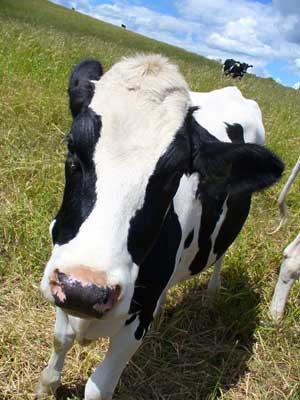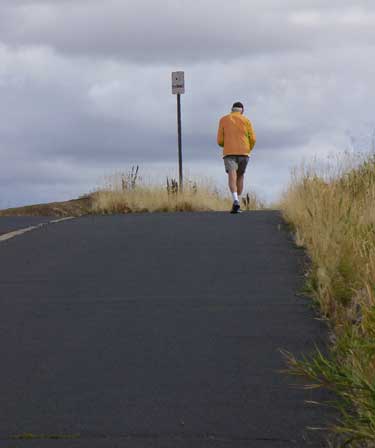Milk Sports Drinks: Sports Nutrition Basics
Are you tired of artificially colored and flavored 'sports drinks'? Why not try a whole food sports drink? Milk and dairy drinks are natural real foods with no chemical additives and aftertaste. Whey smoothies, yogurt drinks, chocolate milk and milk straight up are ideal post workout recovery drinks (Hartman et al. 2007, Roy 2008, Saunders 2011). They are also delicious!
Picture: "Do you have a different flavor than 'green grass'?"
Seven Reasons Milk, Yogurt and Dairy Drinks are the Ideal Sports Drink
1) Milk contains high concentrations of branched chain amino acids. Branched chain amino acids are the ideal fuel for muscle growth and recovery in sports nutrition. Muscles can use branched chain amino acids directly for repair, building and energy. Studies have shown that consuming branched chain amino acids enhances muscle recovery, suppresses muscle damage, reduces inflammation and boosts the immune system (Negro et al. 2008, Matsumoto et al. 2009, Shimomura et al. 2010). It also reduces muscle soreness and perceived fatigue after endurance training (Matsumoto et al. 2009) and squat exercises (Shimomura et al. 2010).
2) Milk contains the ideal mixture of casein and whey protein. Milk contains a 3:1 ratio of casein and whey protein. Consuming this mixture of protein causes an initial rush of protein from whey which is followed by a slower buildup of amino acids from casein. Together, whey and casein, which results in prolonged protein digestion and absorption. As a result, blood amino acid concentrations are elevated over a long time resulting in enhanced protein synthesis (Roy 2008).
3) Milk contains carbohydrates for energy. Milk drinks contains carbohydrates in amounts similar to sports drinks such as Gatoraid and Accelerade (Roy 2008). Unlike table sugar, sucrose, which contains a mixture of glucose and fructose; the milk sugar lactose contains a 1:1 ratio of glucose and galactose. Consuming a combination of glucose and galactose may optimize carbohydrate burning, reducing use of glycogen while increasing endurance (O'Hara et al. 2012, O'Hara et al. 2014). See MooScience page on more on how lactose from dairy sports drinks may enhance exercise performance.
4) Dairy drinks contain a mix of protein, carbohydrates and fat. Mixed macronutrient drinks and food contribute to enhanced protein synthesis after resistance training (Roy et al. 2000, Rasmussen et al. 2000, Tipton et al. 2001).
Picture: Milk sports drinks are ideal for recovery after a long run.
5) Milk and dairy has naturally high amounts of five vital electrolytes; magnesium, potassium, calcium, sodium and chloride. These electrolytes are lost when you sweat and need to be replaced. Milk is an ideal rehydration drink. Milk was equal to a carbohydrate-electrolyte solution in its ability to rehydrate men who were exercising to exhaustion in a humid and hot environment (Watson et al. 2008). Shirreffs et al. (2007) found that drinking milk after exercise rehydrated subjects for a longer time than drinking either a sports drink or water. This may be due to the milk protein (James 2012). Other studies found that a carbohydrate milk protein drink was better absorbed and retained in dehydrated men when compared to a carbohydrate solution (James et al. 2011, James et al. 2013). Milk protein was more effective than carbohydrates at augmenting fluid retention (James et al. 2011).
6) Consuming dairy drinks after exercise builds muscle and lean tissue. Drinking whole, low-fat or nonfat milk increases muscle synthesis and enhanced protein synthesis after exercise (Elliot et al. 2006). Drinking milk after a resistance workout, like weight training, results in greater muscle growth and more lean body tissue. This helps makes milk an ideal sports nutrition food. New research shows that high quality milk proteins support muscle protein synthesis better than other proteins such as soy (Phillips et al. 2009, Volek et al. 2013)
7) Milk is a natural, whole food. Whole foods are better for you than unnatural, chemical filled, so-called 'foods' or 'sports supplements'. Whole foods like yogurt smoothies or milk drinks contain vitamins, minerals and other nutrients that work together to promote good health.
Bonus: Yogurt drinks can also contain beneficial probiotics!
Picture: Take a milk break after exercise!

Electrolyte Minerals Needed for Rehydration in Sports Nutrition
Exercising hard means you lose fluids and minerals. Rehydration requires more than water. When you are slightly dehydrated you may feel thirsty, dizzy, light-headed, tired, dry mouthed and/or have a headache. For the most effective and fastest hydration drink a sports drink containing minerals and sugars/carbohydrates.
Electrolytes are minerals dissolved in body fluid and needed to maintain fluid balance, transmit nerve impulses and contract/relax muscles.
Sodium chloride (salt): Salt dissolves into sodium ions and chloride ions in liquid. Both sodium and chloride ions regulate fluid balance in the body. Sodium regulates the thirst response, enables muscle contraction, facilitates nerve transmission, and maintains blood pressure. Low blood concentrations of sodium can result in cramping, irregular heart rate and low blood pressure. Women are most at danger for low sodium levels since they tend to watch salt intake more than men. Chloride regulates water balance, muscle contractions, and nerve transmissions. Low chloride can cause cramping.
Important note: Many young women have borderline low sodium levels (hyponatremia). Symptoms can include fatigue, headache, nausea, muscle spasms, low blood pressure and feeling dizzy when standing up quickly. You may crave salty foods.
Calcium: Calcium is needed for muscle contractions; low calcium may result in muscle weakness and irregular heart beat.
Potassium: Potassium regulates smooth muscle contractions, acid/base balance, carbohydrate metabolism, glucose metabolism, and blood pressure. Low potassium may cause dizziness, confusion, irregular heartbeat and/or muscle cramps. It is normal to experience some of these symptoms when you are working hard in the heat. Often they are a sign of a a potassium deficiency.
Magnesium: Magnesium is necessary for energy production, muscle movement and nerve impulses. Low magnesium levels can cause muscle weakness, muscle tremors, low blood pressure, anxiety and cramping.
You need the correct balance of these electrolytes to maintain optimal hydration and athletic endurance. Unlike most commercial sports drinks, milk and dairy products contain an ideal mix of these vital minerals.
Dairy products contain electrolytes needed for rehydration after exercise. Milk has approximately 400 mg potassium per 250 mL serving (a little over one cup); this is between 4-25 times higher than the potassium found in sports drinks. Milk has approximately 130 mg sodium per cup which is equal to the sodium found in sports drinks. Milk also contains calcium and magnesium which are rarely found in sports drinks. Click here for a chart comparing the electrolytes in milk to those in sports drinks.
More on electrolytes.
References:
Elliot TA, Cree MG, Sanford AP, Wolfe RR, Tipton KD. Milk ingestion stimulates net muscle protein synthesis following resistance exercise. Med Sci Sports Exerc. 2006;38:667-674. Pubmed. Hartman JW, Tang JE, Wilkinson SB, Tarnopolsky MA, Lawrence RL, Fullerton AV, Phillips SM. Consumption of fat-free fluid milk after resistance exercise promotes greater lean mass accretion than does consumption of soy or carbohydrate in young, novice, male weightlifters. Am J Clin Nutr 2007;86:373-381. Pubmed. Full text. James L. Milk protein and the restoration of fluid balance after exercise. Med Sport Sci. 2012;59:120-6. Pubmed. doi: 10.1159/000341958 James LJ, Clayton D, Evans GH. Effect of milk protein addition to a carbohydrate-electrolyte rehydration solution ingested after exercise in the heat. Br J Nutr. 2011;105:393-9. Pubmed. doi: 10.1017/S0007114510003545 James LJ, Evans GH, Madin J, Scott D, Stepney M, Harris R, Stone R, Clayton DJ. Effect of varying the concentrations of carbohydrate and milk protein in rehydration solutions ingested after exercise in the heat. Br J Nutr. 2013;110:1285-91. Pubmed. doi: 10.1017/S0007114513000536 Matsumoto K, Koba T, Hamada K, Sakurai M, Higuchi T, Miyata H. Branched-chain amino acid supplementation attenuates muscle soreness, muscle damage and inflammation during an intensive training program. J Sports Med Phys Fitness. 2009;49:424-31. Pubmed. Negro M, Giardina S, Marzani B, Marzatico F. Branched-chain amino acid supplementation does not enhance athletic performance but affects muscle recovery and the immune system. J Sports Med Phys Fitness. 2008;48:347-51. Pubmed. Phillips SM, Tang JE, Moore DR. The role of milk- and soy-based protein in support of muscle protein synthesis and muscle protein accretion in young and elderly persons. J Am Coll Nutr. 2009 Aug;28:343-54. Pubmed. Roy BD. Milk: the new sports drink? J Int Soc Sports Nutr. 2008;5:15. Pubmed. Full text. doi: 10.1186/1550-2783-5-15 Roy BD, Fowles J, Hill R, Tarnopolsky MA. Macronutrient intake and whole body protein metabolism following resistance exercise. Med Sci Sports Exerc 2000;32:1412-1418. Pubmed.
Rasmussen BB, Tipton KD, Miller SL, Wolf SE, Wolfe RR. An oral essential amino acid-carbohydrate supplement enhances muscle protein anabolism after resistance exercise. J Appl Physiol 2000;88:386-392. Pubmed. Full text. Saunders MJ. Carbohydrate-protein intake and recovery from endurance exercise: is chocolate milk the answer? Curr Sports Med Rep. 2011 Jul;10(4):203-10. Pubmed. doi: 10.1249/JSR.0b013e318223ccb4 Shimomura Y, Inaguma A, Watanabe S, Yamamoto Y, Muramatsu Y, Bajotto G, Sato J, Shimomura N, Kobayashi H, Mawatari K. Branched-chain amino acid supplementation before squat exercise and delayed-onset muscle soreness. Int J Sport Nutr Exerc Metab. 2010;20:236-44. Pubmed. Shirreffs SM, Watson P, Maughan RJ. Milk as an effective post-exercise rehydration drink. Br J Nutr. 2007;98:173-80. Pubmed. Tipton KD, Rasmussen BB, Miller SL, Wolf SE, Owens-Stovall SK, Petrini BE, Wolfe RR: Timing of amino acid-carbohydrate ingestion alters anabolic response of muscle to resistance exercise. Am J Physiol Endocrinol Metab 2001;281:E197-206. Pubmed. Full text. Volek JS, Volk BM, Gómez AL, Kunces LJ, Kupchak BR, Freidenreich DJ, Aristizabal JC, Saenz C, Dunn-Lewis C, Ballard KD, Quann EE, Kawiecki DL, Flanagan SD, Comstock BA, Fragala MS, Earp JE, Fernandez ML, Bruno RS, Ptolemy AS, Kellogg MD, Maresh CM, Kraemer WJ. Whey protein supplementation during resistance training augments lean body mass. J Am Coll Nutr. 2013;32:122-35. Pubmed. doi: 10.1080/07315724.2013.793580 Watson P, Love TD, Maughan RJ, Shirreffs SM. A comparison of the effects of milk and a carbohydrate-electrolyte drink on the restoration of fluid balance and exercise capacity in a hot, humid environment. Eur J Appl Physiol. 2008;104:633-42. Pubmed. doi: 10.1007/s00421-008-0809-4
